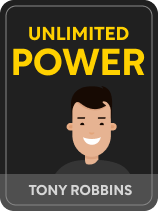

This article is an excerpt from the Shortform book guide to "Unlimited Power" by Tony Robbins. Shortform has the world's best summaries and analyses of books you should be reading.
Like this article? Sign up for a free trial here.
Do you believe you have what it takes to achieve success in life? How do you get rid of self-limiting beliefs?
Everyone has self-limiting beliefs that they’ve built—largely without realizing it—based on their upbringing, personal experiences, and knowledge. These self-limiting beliefs prevent you from setting ambitious goals and living up to your potential.
Here’s Tony Robbins’s advice for overcoming self-limiting beliefs.
Choose Powerful Beliefs
According to Tony Robbins, it is within your control to replace your disempowering beliefs with powerful ones. Overcoming self-limiting beliefs is as easy as simply deciding to do so: You can identify a disempowering belief, pick a powerful belief that you’d like to replace it, and then act according to that new belief.
To help with this process, Robbins suggests that you imagine what life will be like once that new, empowering belief is in place. Envision, as clearly and specifically as possible, a situation in which you act according to that new belief. This will put you in the right mindset to go forward and make your imagined life a reality.
| Overcoming Resistance to Change Many people naturally resist change, especially when it comes to something as personal as their beliefs. How do you overcome this resistance? In The Success Principles, entrepreneur Jack Canfield suggests asking yourself a series of questions to determine whether a change you’re considering is really necessary and, if so, to figure out why you’re resisting that change. By answering these questions, Canfield says that you can overcome your fear of change and replace it with excitement for the possibilities that change could create for you. What change am I resisting? Start by clearly defining the change you’re thinking of making. What am I afraid of? Try to pinpoint the reason why you’re resisting that change. For example, do you think it will be hard to do? Does it feel like you’d be giving up part of who you are? Are you concerned that the change itself might have negative consequences—and if so, what’s the absolute worst that could happen? What if I don’t make the change? What benefits are there to keeping things as they are? What potential downsides are there—what’s the worst-case scenario for not making this change? How do I begin making this change? Imagine that you’ve already decided to go through with it; what are your first steps? What will your life look like once you take those steps? Note that this step is the same as Robbins’s suggestion to visualize how you’ll behave in the future. When will I begin making this change? Once you know how to get started, the only question remaining is when you’ll do so. Setting a deadline can help encourage you to get started. |
Determine What You Value Most
Robbins adds that values are a particularly important subset of beliefs: They’re beliefs about what’s right and wrong, or what’s good and bad. Values are important because while other beliefs determine what you can do, your values determine what you will do. For example, someone who values wealth will work hard at a profitable career, while someone who values friendship will work hard at relationships instead. Someone who values joy will seek it out; someone who values health might forgo momentary joys like junk food and alcohol to stay fit.
Just as people have numerous beliefs, they have numerous different values. Furthermore, sometimes those values can oppose each other—for instance, someone who values both honesty and self-esteem might experience some confusing feelings if someone else’s honesty damages his self-esteem.
That’s why Robbins suggests creating a list of values and then ranking them by importance. Doing so serves two purposes: First, it allows you to see what’s important to you and decide what’s most important. Second, if you find yourself caught between conflicting values, you’ll know which one should take precedence.
Finally, remember that it’s possible to pick and choose values just like any other beliefs, so make sure that your personal values are beneficial and empowering.
(Shortform note: Since the point of choosing values is to make sure that all of your energy and intentions are pushing you in the same direction, it’s important to limit how many values you commit to—having too many values will inevitably pull you in different directions, causing confusion and wasting energy. In her book Dare to Lead, Brenè Brown suggests choosing just two key values to practice. Much like Robbins, Brown suggests starting by writing a list of your values and then choosing the two that are most important to you. Since in Brown’s framework you’re only pursuing two values, it’s especially important to make sure they’re beneficial and empowering—limiting yourself to just two values that don’t fulfill these criteria won’t support your growth.)
Align Your Beliefs, Values, and Actions
Robbins concludes by saying that you can achieve incredible energy and focus by overcoming self-limiting beliefs and aligning empowering beliefs and values with bold, confident action. He calls this congruence: a state in which you’re able to bring all of your mental and physical abilities to bear on whatever task is at hand.
The trick to reaching this state is making sure that all of your thoughts, desires, and actions are working toward the same objective. That’s why it’s crucial to take control of your mind—you must make sure that you’re not obstructing yourself with disempowering beliefs or conflicting values.
For example, someone who talks about what he “wants” to do, or what “might” happen, is getting in his own way; he doesn’t fully believe that he’ll achieve his goals. Therefore, he won’t be able to fully harness his energy and his conviction.
| Counterpoint: Look for Enjoyable Tasks What Robbins calls congruence is very similar to what psychologist Mihaly Csikszentmihalyi calls flow: a state in which you’re completely focused on the task at hand and do your best possible work while feeling like you’re not putting forth any effort at all. While Robbins says that you achieve this state by acting in line with your values and making sure your thoughts, desires, and actions align, Csikszentmihalyi believes you can only achieve flow if you’re doing something enjoyable; furthermore, that enjoyment must come from accomplishment and improvement. In Flow, he provides a list of common qualities of enjoyable tasks: There’s a clear goal, and you have the skills to reach it. In other words, you know what you’re trying to accomplish, and you’re confident that you can accomplish it. You’re in control. While someone else might have set the goal for this task, how you reach that goal is up to you. You receive immediate feedback. This doesn’t necessarily mean feedback from another person—rather, you have a way to easily keep track of your progress. For example, a writer can use word count as a form of feedback; an increasing word count means that the writer is making progress. You become completely absorbed in the task. This is the essence of flow: While working on the task, you lose track of time and may even temporarily lose your sense of self. Every bit of your attention is on completing the task, and there are no extraneous thoughts. Some people also call this hyperfocus. Note that Csikszentmihalyi’s “flow state” doesn’t require that your values and beliefs be in line with your goal. All that’s required for flow is an enjoyable task that you can get absorbed in. |

———End of Preview———
Like what you just read? Read the rest of the world's best book summary and analysis of Tony Robbins's "Unlimited Power" at Shortform.
Here's what you'll find in our full Unlimited Power summary:
- How to harness your thoughts and beliefs and turn them into purposeful action
- How to find even greater success through cooperation and leadership
- How you can use your successes to help others and improve the world






